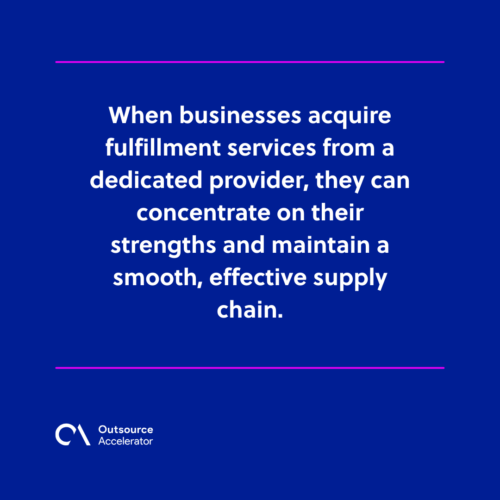Improving efficiency through outsourced fulfillment services

Companies are always looking for ways to improve efficiency and streamline their operations. One effective way is by using outsourced fulfillment services.
Partnering with a reliable provider allows businesses to lighten their order processing load, warehousing, inventory management, and handling returns and exchanges.
Defining fulfillment services
Fulfillment services refer to handling orders from purchase to delivery. The tasks involve:
- Order processing
- Warehousing
- Inventory control
When businesses acquire fulfillment services from a dedicated provider, they can concentrate on their strengths and maintain a smooth, effective supply chain.

Types of fulfillment services
There are several fulfillment services, each catering to different aspects of the supply chain.
Here are some of the most common types:
Order fulfillment
Order fulfillment is at the core of any fulfillment service. It encompasses:
- Receiving and handling customer orders
- Selecting and packing items
- Delivering orders to customers
Businesses that outsource this procedure guarantee precise and prompt delivery, leading to contented customers and recurring transactions.
Warehousing and inventory management
Efficient warehousing and inventory control are vital for businesses to satisfy customer needs while cutting expenses.
A fulfillment partner can manage storage, arrangement, and inventory monitoring, guaranteeing product availability for order fulfillment.
Businesses can leverage their outsourced staff’s inventory management skills to evade shortages and enhance supply chains.
Returns and exchange handling
Product returns and exchanges are common in business, but dealing with them can be complex and time-consuming.
A fulfillment partner can handle the reverse process, including:
- Inspecting products
- Managing inventory
- Facilitating customer refunds or exchanges
It saves time and lets companies enhance their customer satisfaction by offering a seamless returns experience.
Challenges in fulfillment services
While outsourcing fulfillment services brings numerous benefits, organizations should also be aware of the drawbacks.
Understanding and addressing these challenges is key to creating a seamless and efficient fulfillment process:
Complex logistics
Fulfillment services include managing complex logistics like shipping goods, tracking orders, and working with carriers. A reliable partner can help businesses handle these tasks and ensure timely customer deliveries.
Quality control
Maintaining consistent quality in packaging and ensuring products are in proper condition before shipping is crucial.
Inadequate quality control can lead to damaged products and unhappy customers. Maintaining quality during fulfillment is crucial for meeting customer expectations.
A credible partner that follows strict quality control measures can build customer satisfaction and protect the business’s brand reputation.
Communication and transparency
Clear communication and openness are essential in any business partnership.
Setting up transparent communication and real-time data access is crucial when working with a fulfillment provider. It guarantees insight into order progress, inventory levels, and potential concerns.
It facilitates proactive issue-solving and smooth cooperation between the business and the fulfillment partner.

Advantages of outsourcing fulfillment services
Outsourcing fulfillment services offers numerous advantages, allowing businesses to optimize operations and focus on core competencies.
Save time and resources
One of the primary reasons companies opt for outsourcing fulfillment is the potential for cost savings. Outsourcing eliminates the need to invest in warehouse space, equipment, and technology.
Additionally, businesses can benefit from economies of scale as fulfillment providers handle multiple clients’ orders, spreading operational costs.
Scalability and flexibility
Fulfillment requirements can change because of seasons or sudden growth. Outsourcing lets businesses easily adjust their operations without extra investments.
A trusted partner can handle varying orders promptly, making it especially useful during busy seasons or rapid growth.
Enhanced customer experience
Correct and on-time order fulfillment results in a positive customer experience.
Fulfillment providers can offer faster shipping options, real-time order tracking, and efficient returns management, enhancing customer satisfaction and loyalty.
Choosing the right fulfillment partner
Selecting the right fulfillment partner is essential to the success of outsourcing fulfillment services.
Consider the following factors when evaluating potential partners:
Assess business needs
Before choosing a fulfillment partner, businesses should evaluate their exact needs. They should look at their order amounts, product kinds, geographic ranges, and industry rules.
Grasping these aspects helps find a fulfillment provider that suits the firm’s requirements.
Technology and integration
Effective fulfillment relies on advanced technology and seamless integration.
When assessing partners, look at their tech capabilities, such as:
- Real-time stock tracking
- Automated orders
- E-commerce platform connections.
A tech-savvy partner streamlines operations and provides accurate data for better decisions.
Service level agreements (SLAs)
A clear service level agreement (SLA) sets expectations and accountability between the business and its fulfillment partner.
Look closely at SLAs that outline vital performance measures like order speed, accuracy, and timely delivery. It reduces risks and confirms the partner meets service expectations.
Future trends in fulfillment services
The fulfillment field evolves with customer demands and technology. Businesses that anticipate these changes can gain a competitive edge.
Outlined below are the top trends that will continuously shape order fulfillment processes:
Automation and robotics
Automation and robots are changing how fulfillment works. With automated picking and robot helpers, these advances boost efficiency, reduce mistakes, and speed up order processing.
Businesses should think about using automation and robots to improve productivity and competitiveness.
Sustainable fulfillment
Sustainability matters more to both consumers and businesses. Fulfillment providers go green by using eco-friendly packaging, energy-saving warehouses, and carbon-neutral shipping.
Team up with eco-conscious providers to show a business’s environmental commitment and meet consumers’ expectations.
Drones and autonomous vehicles
The emergence of drones and self-driving vehicles offers thrilling prospects for the future of fulfillment. With their quick and efficient package delivery capabilities, these technologies could transform the final leg of delivery.
Businesses should monitor regulations and consider ways to utilize these innovations in their fulfillment plans.

Explore and invest in tailored fulfillment solutions
Outsourcing fulfillment brings many advantages to businesses aiming to boost efficiency and concentrate on their strengths.
Businesses can enhance supply chains, improve customer experiences, and anticipate upcoming trends through a trustworthy partner.
While assessing potential partners, consider factors like business needs, technology merging, and service commitments. Embracing automation, sustainability, and new tech sets businesses up for lasting success in a competitive market.







 Independent
Independent




